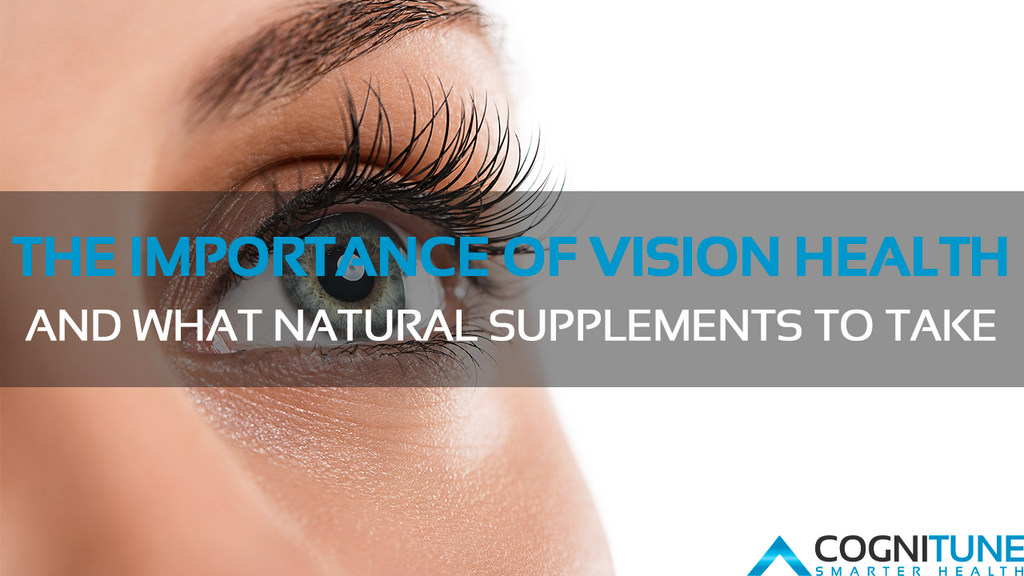The Importance of Vision Health and What Natural Supplements to Take

You might have heard about new research suggesting that certain nutrients can help prevent or delay eye disease or problems. You might have also heard about some claims that there are supplements that you can buy that contain these nutrients.
What can you do to protect your eyesight and eye health using vision health supplements? What should you believe? Below you’ll find information that will help you figure out what you should do and take to help your vision health.
Before we begin, remember that your eye doctor should always be the first person you go to regarding information about your vision health. Regardless of their dosage, vision supplements aren’t a cure for health problems and shouldn’t be used as a substitute for the medication prescribed by your eye doctor.
Click here to check price and purchase our recommended Eye Health Supplement on Amazon.
Multivitamins and Vision Health
Before asking your doctor about adding huge dosages of vision health supplements to your daily regime, take a look at your multivitamin. You might find that you’re already taking many of the following nutrients that aid in eye health. If not, look for these nutrients in your new multivitamin for healthy vision.
These nutrients include:
- Omega-3 essential fatty acids
- Folic acid
- Thiamin
- Calcium
- Lutein
- Selenium
- Zeaxanthin
- Zinc
- Beta-carotene
- Vitamin E
- Vitamin C
If you have trouble finding a multivitamin that contains most or all of these nutrients, they are each sold individually.
Read Labels
As you would with any prepared food that you purchase, you should read the labels on the vision health supplements to make sure that you’re getting what you want. Below are some tips:
- The FDA regulates dietary supplements, but they treat them as food rather than medicine; unlike drug manufacturers, those who produce supplements aren’t required to show that their products are effective or safe before selling them. The FDA can get a supplement taken off the shelves, though, and supplement manufacturers have to keep certain standards that are very much like those for pharmaceutical makers.
- If fish oil is listed as the source of the omega-3 essential fatty acids, then the label should have a spot that states that it’s been produced in a way that eliminates any contaminants, particularly mercury.
- Stay away from supplements with fillers, which are ingredients used to bulk up products, so they look like there’s more in them. These fillers include dairy products, corn, and wheat, which can all cause allergic and digestive problems for many people.
- Think about going with the organic vision health supplements. You will end up paying more, but the quality of the supplements will be much better.
- If you tend to have stomach issues, capsules might be the better choice over tablets, which are harder for your body to absorb. Additionally, taking your supplements with food reduces the chances of having stomach issues.
- Look for vision health supplements that come from a reputable manufacturer because quality can widely vary.
- The bottle of vision health care supplements should be sealed for your protection. If it’s not sealed, or the seal has been broken, don’t buy it.
- Make sure that the product you end up purchasing is fresh: check the expiration date.
Click here to check price and purchase our recommended Eye Health Supplement on Amazon.
What Natural Supplements Can Help with Vision Health?
The natural supplements listed below have all been found to be beneficial in helping vision health.
Zeaxanthin and Lutein
Zeaxanthin and Lutein are carotenoids, which are pigments that are found in your retina and plants. By supplementing these pigments, you could help increase the density in your retina. These pigments also work by absorbing high-energy ultraviolet and blue light, both of which can harm your eyes.
Thiamine (Vitamin B1)
Vitamin B1 is very important for your vision health. You’ll find that there’s evidence supporting the claim that taking vitamin B1, along with additional vitamins, can greatly lessen the risk of getting cataracts.
Known as an “anti-stress” B vitamin, vitamin B1 helps to reduce inflammation.
Zinc
Zinc is also naturally found in your eyes and is an influential antioxidant that protects your eye from cell damage. You may find that when you take a zinc supplement, your body’s copper absorption isn’t as great, so it’s highly recommended that you take copper and zinc supplements.
Omega-3 Fatty Acids
Most Americans’ diets don’t have enough omega-3 fatty acids; the primary source of omega-3 fatty acids is fish. The photoreceptor cells in your eye’s retina have a large amount of omega-3 fatty acids.
There is a belief that a type of omega-3 fatty acid, docosahexaenoic acid (DHA), can help develop retinal cells. It’s also believed to have a role in reducing the inflammation in your eye and allowing the cells of your retina and cornea to heal and regenerate after being damaged due to aging and light exposure.
Vitamin C
There have been several big studies done that show that vitamin C helps to reduce the risk of getting some types of cataracts. Two of the studies done also found that taking a combination of vitamin C and E supplements helped reduce the risk for cataracts and even slowed down the progression of cataracts.
CogniTune Supplements
If you want a natural supplement that contains a few of these ingredients, look into purchasing NuClarity Vision by CogniTune. This supplement includes Vitamin C, Vitamin E, Lutein, Zeaxanthin, and Zinc plus several other plant-based compounds with antioxidant properties that have been shown to improve vision, including Bilberry, Saffron, and Astaxanthin. These ingredients, as stated above, help protect your eyes against cell damage and cataracts.
Give this natural supplement a try to help support your vision health and make it so that you’re protecting your eyes against damage.
Click here to check price and purchase our recommended Eye Health Supplement on Amazon.
